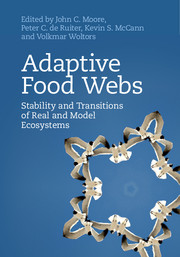11 results
Introduction
-
-
- Book:
- Adaptive Food Webs
- Published online:
- 05 December 2017
- Print publication:
- 21 December 2017, pp 1-6
-
- Chapter
- Export citation
Contributors
-
- Book:
- Adaptive Food Webs
- Published online:
- 05 December 2017
- Print publication:
- 21 December 2017, pp viii-xiv
-
- Chapter
- Export citation
Contents
-
- Book:
- Adaptive Food Webs
- Published online:
- 05 December 2017
- Print publication:
- 21 December 2017, pp v-vii
-
- Chapter
- Export citation
Part II - Food Webs: From Traits to Ecosystem Functioning
-
- Book:
- Adaptive Food Webs
- Published online:
- 05 December 2017
- Print publication:
- 21 December 2017, pp 105-286
-
- Chapter
- Export citation
Part III - Food Webs and Environmental Sustainability
-
- Book:
- Adaptive Food Webs
- Published online:
- 05 December 2017
- Print publication:
- 21 December 2017, pp 287-405
-
- Chapter
- Export citation
Preface
-
- Book:
- Adaptive Food Webs
- Published online:
- 05 December 2017
- Print publication:
- 21 December 2017, pp xv-xvi
-
- Chapter
- Export citation
Copyright page
-
- Book:
- Adaptive Food Webs
- Published online:
- 05 December 2017
- Print publication:
- 21 December 2017, pp iv-iv
-
- Chapter
- Export citation
Index
-
- Book:
- Adaptive Food Webs
- Published online:
- 05 December 2017
- Print publication:
- 21 December 2017, pp 406-416
-
- Chapter
- Export citation
13 - Global Metawebs of Spider Predation Highlight Consequences of Land-Use Change for Terrestrial Predator–Prey Networks
- from Part II - Food Webs: From Traits to Ecosystem Functioning
-
-
- Book:
- Adaptive Food Webs
- Published online:
- 05 December 2017
- Print publication:
- 21 December 2017, pp 193-213
-
- Chapter
- Export citation
Part I - Food Webs: Complexity and Stability
-
- Book:
- Adaptive Food Webs
- Published online:
- 05 December 2017
- Print publication:
- 21 December 2017, pp 7-104
-
- Chapter
- Export citation

Adaptive Food Webs
- Stability and Transitions of Real and Model Ecosystems
-
- Published online:
- 05 December 2017
- Print publication:
- 21 December 2017



